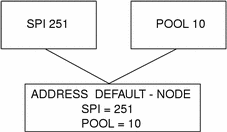Default Mobile Node
The Address section for a default mobile node contains the Type, SPI, and Pool labels. The Default-Node parameter enables you to permit all mobile nodes to get service if they have the correct SPI (defined in this section). The Address section, using the Default-Node parameter, has the following syntax:
[Address Default-Node]
Type = Node
SPI = SPI-identifier
Pool = Pool-identifier
|
The Default-Node enables you to reduce the size of the configuration file; otherwise, each mobile node requires its own section. However, the Default-Node does pose a security risk. If a mobile node is no longer trusted for any reason, you need to update the security information on all trusted mobile nodes. This task can be very tedious. However, you can use the Default-Node in networks that consider security risks unimportant.
The following table describes the labels and values that you can use in the Address section for a default mobile node.
Table 2-7 Address Section Labels and Values--Default Mobile Node|
Label |
Value |
Description |
|---|---|---|
|
Type |
node |
Specifies entry for a mobile node. |
|
SPI |
n |
Specifies SPI value for the associated entry. |
|
Pool |
n |
Allocates the pool from which an address is assigned to a mobile node. |
You must have corresponding SPI and Pool sections for the SPI and Pool labels defined in the Address section with a default mobile node, as shown in the following illustration.
Figure 2-2 Corresponding SPI and Pool Sections for Address Section With a Default Mobile Node

- © 2010, Oracle Corporation and/or its affiliates
